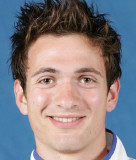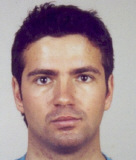Speed Skating: 24-year-old
Nataliya Rybakova of Kazakhstan finished 28th in the
women's 3000 metre event. Her time of 4:38.76 was 36½ seconds behind the gold medallist and 12 seconds behind the next-to-last-place finisher.
 Luge:
Luge: An extremely slow third run put
Mark Hatton, 32, of Great Britain in 35th place in the
men's single competition. Compare his combined time of 4:12.899 (after four runs) with the gold medallist's time of 3:26.088. Two other competitors had runs in excess of a minute. It turns out that you need to complete all four runs to finish; a spill on the fourth run created the event's lone
DNF despite three clean previous runs.
Ski Jumping: Estonian ski jumper Jaan Jüris, 28, received a score of 88.5 in the preliminary round of the individual normal hill event and, like everyone else not in the top 30, did not advance to the final round. He finished 50th overall; the gold medallist's score after two rounds was 266.5, or 131.0 and 135.5 on each jump, respectively.
[I made an error in these results; see correction.] Short Track Speed Skating
Short Track Speed Skating is a little trickier to report on because it's based on heats rather than times: it frequently occurs that a winning time in one heat is slower than the slowest time in another. Your time, in other words, doesn't matter insofar as the standings are concerned. So I'm making an executive decision to post the slowest time overall, whether it comes in the heats, semis or finals. (If nothing else, they record world-record times in this sport, don't they?) Anyway, that's a long enough prologue to some actual results, to wit, those from the men's 1,500-metre individual event (results:
heats,
semis,
finals), where 23-year-old French skater
Jean-Charles Mattei had the slowest time -- 2:43.543, well back of other results. Though I didn't see his race, that time suggests to me that he crashed, got up and finished, or something along those lines -- I've seen that sort of thing happen often enough in short track.
Standings to date: Nothing earth-shattering to report; just a bunch of countries putting their first last-place finishes on the board. South Korea still leads for the moment.
Labels: france, kazakhstan, luge, short track, speed skating, torino 2006, uk
 Luge: An extremely slow third run put
Luge: An extremely slow third run put  Short Track Speed Skating is a little trickier to report on because it's based on heats rather than times: it frequently occurs that a winning time in one heat is slower than the slowest time in another. Your time, in other words, doesn't matter insofar as the standings are concerned. So I'm making an executive decision to post the slowest time overall, whether it comes in the heats, semis or finals. (If nothing else, they record world-record times in this sport, don't they?) Anyway, that's a long enough prologue to some actual results, to wit, those from the men's 1,500-metre individual event (results:
Short Track Speed Skating is a little trickier to report on because it's based on heats rather than times: it frequently occurs that a winning time in one heat is slower than the slowest time in another. Your time, in other words, doesn't matter insofar as the standings are concerned. So I'm making an executive decision to post the slowest time overall, whether it comes in the heats, semis or finals. (If nothing else, they record world-record times in this sport, don't they?) Anyway, that's a long enough prologue to some actual results, to wit, those from the men's 1,500-metre individual event (results:  Alpine Skiing: Romanian skier
Alpine Skiing: Romanian skier  In the
In the 
